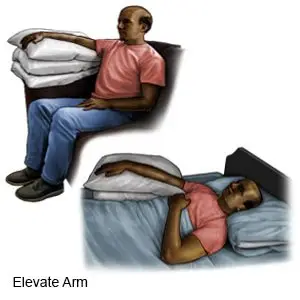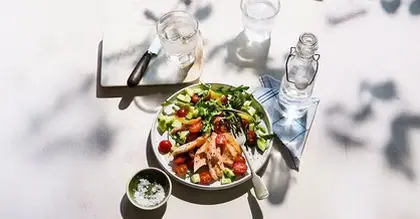What is extravasation?
Extravasation is when fluid leaks out of your vein and into the soft tissue around an IV. The fluid is a vesicant medicine. This means that it can cause tissue damage, blisters, or severe tissue loss. Some examples of vesicant medicines include chemo medicines, contrast liquid, certain antibiotics, and seizure medicine.
What are the signs and symptoms of extravasation?
- Pain around the IV site
- Inflammation and tightness of your skin
- Trouble flushing the IV catheter
- Pale, cool skin
- Blisters
What causes extravasation?
- The IV catheter may push through the side of your vein.
- The IV catheter may move from where it is inserted.
- Fluid may leak through the area where the catheter enters the vein.
- The vein may be fragile and may tear with the IV fluid.
- Fluid may leak through the side of your vein.
- A blockage may cause the medicine or fluid to build up.
What increases my risk for extravasation?
- Fragile veins or skin
- Not being able to see the IV site
- IV treatments over a long period of time
- IV treatments that are given quickly or that give a large amount of fluid
- Type of medicine being given, such as a chemo medicine
How is extravasation treated?
Your healthcare provider may do any or all of the following:
- Stop the IV infusion
- Remove the IV
- Outline the area with a marker
- Take pictures of the area
- Raise and rest your limb on pillows
- Apply a hot or cold compress on the area
- Inject medicine into the tissue
Treatment options
The following list of medications are in some way related to or used in the treatment of this condition.
- dexrazoxane
- Vitrase
- Hylenex
- Amphadase
- Hydase
View more treatment options
How can I manage my symptoms?
- Continue to apply ice on the area as directed or for 15 to 20 minutes every hour. Use an ice pack, or put crushed ice in a plastic bag. Cover it with a towel. Ice helps prevent tissue damage and decreases swelling and pain.
- Continue to apply heat on the area as directed or for 20 to 30 minutes every 2 hours. Heat helps decrease pain and muscle spasms.
- Continue to elevate the area above the level of your heart as often as you can. This will help decrease swelling and pain. Prop your limb on pillows or blankets to keep it elevated comfortably.

- Ask how to clean the area. Your healthcare provider may bandage the area. He or she may tell you which products you can apply on the area, such as a mild soap.
- Medicine may help relieve pain or inflammation:
- Acetaminophen decreases pain and fever. It is available without a doctor's order. Ask how much to take and how often to take it. Follow directions. Read the labels of all other medicines you are using to see if they also contain acetaminophen, or ask your doctor or pharmacist. Acetaminophen can cause liver damage if not taken correctly.
- NSAIDs , such as ibuprofen, help decrease swelling, pain, and fever. This medicine is available with or without a doctor's order. NSAIDs can cause stomach bleeding or kidney problems in certain people. If you take blood thinner medicine, always ask your healthcare provider if NSAIDs are safe for you. Always read the medicine label and follow directions.
When should I seek immediate care?
- You have severe pain.
When should I call my doctor?
- You have a fever.
- Your pain does not get better, or gets worse.
- The area becomes more red and swollen.
- You see red streaks coming from the area.
- You have questions or concerns about your condition or care.
Care Agreement
You have the right to help plan your care. Learn about your health condition and how it may be treated. Discuss treatment options with your healthcare providers to decide what care you want to receive. You always have the right to refuse treatment. The above information is an educational aid only. It is not intended as medical advice for individual conditions or treatments. Talk to your doctor, nurse or pharmacist before following any medical regimen to see if it is safe and effective for you.© Copyright Merative 2023 Information is for End User's use only and may not be sold, redistributed or otherwise used for commercial purposes.




